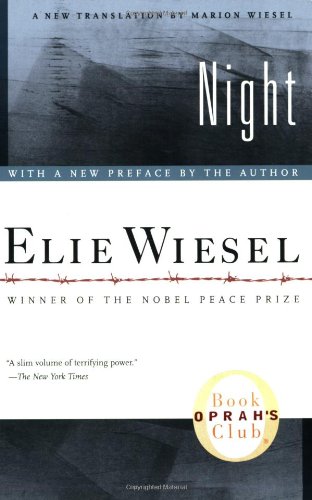All Nonfiction
- Bullying
- Books
- Academic
- Author Interviews
- Celebrity interviews
- College Articles
- College Essays
- Educator of the Year
- Heroes
- Interviews
- Memoir
- Personal Experience
- Sports
- Travel & Culture
All Opinions
- Bullying
- Current Events / Politics
- Discrimination
- Drugs / Alcohol / Smoking
- Entertainment / Celebrities
- Environment
- Love / Relationships
- Movies / Music / TV
- Pop Culture / Trends
- School / College
- Social Issues / Civics
- Spirituality / Religion
- Sports / Hobbies
All Hot Topics
- Bullying
- Community Service
- Environment
- Health
- Letters to the Editor
- Pride & Prejudice
- What Matters
- Back
Summer Guide
- Program Links
- Program Reviews
- Back
College Guide
- College Links
- College Reviews
- College Essays
- College Articles
- Back
Night by Elie Wiesel
The book Night by Elie Wiesel is an autobiography describing the time the author served in Auschwitz, the most brutal of the German concentration camps. Wiesel’s survival of the Holocaust was tragic but also remarkable with the way German SS officers treated their prisoners. Wiesel watched his whole family die right before his eyes. The author exposes the harsh side of reality by giving the reader a close and honest glimpse of what a living Hell actually is. Wiesel mentions numerous times throughout the book how being inhumane became humane after time. Prisoners of the camp forgot what love and compassion felt like. Prisoners anticipated death more than anything because the only reason they were living was to suffer.
The author had strong faith in his Jewish religion before the Holocaust took place. For someone to believe so strong in their God and then have all these horrible events happen for no reason has to be truly heartbreaking for the individual. Wiesel explains throughout the book how believing in God became foolish. Auschwitz was Hell on Earth, meaning there was no sign of God anywhere. It is hard to believe that such a place existed at one point but the way Wiesel writes assures that this place was more than real, it was life. Vivid descriptions of what he witnessed daily of innocent people of all ages being slaughtered like sheep. No sign of humanity was to be found during these times. This book changes mindsets of millions and gives the reader an appreciation for the life they have. Wiesel has witnessed Hell with his own eyes and continues to spread awareness of human suffering with this book.
Similar Articles
JOIN THE DISCUSSION
This article has 0 comments.

